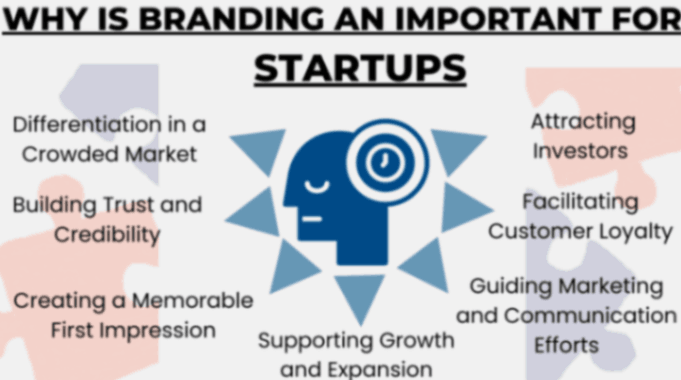
What is Brand?
A brand is more than just a logo or a name; it represents the entire identity and perception of a product, service, or company in the minds of consumers. A brand encompasses not only the visual elements like logo and design but also the brand’s values, personality, messaging, and the overall experience it delivers to its audience. A strong brand communicates a promise, establishes credibility, and creates a lasting connection with its target audience.
The Importance of a Strong Brand:
- Increased Recognition: A strong brand is like a familiar face in a crowd. People quickly recognize and remember it. (Recognition means more visibility, and the more your brand is noticed, the more likely people are to choose it.)
- Customer Trust: Trust is like the glue that keeps customers coming back. A strong brand builds trust like a reliable friend. When people trust a brand, they feel confident in their choice, making repeat business and positive recommendations more likely.
- Competitive Advantage: Think of a strong brand as the superhero in a competition. It stands out and has a unique edge. In a crowded market, a strong brand helps you be the preferred choice, giving you an advantage over others.
- Positive Perception: Your brand is like a reputation superhero. It shapes how people see you. A positive perception attracts customers and partners, creating a favorable environment for growth.
- Customer Loyalty: Loyalty is like having a group of brand fans. They stick around and cheer for you. Loyal customers are more likely to stick with your brand, even when new options arise, providing a stable customer base.
- Premium Pricing Potential: Imagine your brand as a VIP experience. People are willing to pay a bit more for something they trust and value. A strong brand allows you to charge a premium, reflecting the perceived higher value of your products or services.
- Easier Marketing: A strong brand is like having a great story to tell. Marketing becomes easier because people want to listen. With a compelling brand, your marketing efforts become more effective, reaching and resonating with your audience.
- Employee Pride: Employees are like brand ambassadors. A strong brand makes them proud to be part of the team. Proud and motivated employees contribute positively to the overall success and image of the company.
What is Branding?
Branding is the strategic process of creating, developing, and maintaining a brand. It involves defining the brand’s identity, positioning it in the market, and crafting a consistent and compelling message that resonates with the target audience. Branding goes beyond just designing a logo or choosing a color palette; it includes shaping the brand’s personality, values, and voice. It is about creating a cohesive and memorable brand experience at every touchpoint, be it through marketing materials, customer interactions, or the product or service itself. Effective branding aims to evoke specific emotions, build trust, and differentiate the brand from competitors in a meaningful way. It is an ongoing effort that adapts to market changes and evolves with the growth and development of the business.
What is Branding for Startups?

Importance Of Branding For Startups
For startups, branding is the linchpin for market entry. It’s the key to standing out, gaining trust, and making a lasting impression. Effective branding not only attracts customers but also signals credibility to investors. In the fast-paced startup world, where adaptability is crucial, a strong brand serves as a guiding star, ensuring a firm grip on the market and fostering long-term success.
Branding for startups
Branding for startups is the intentional process of creating a unique and memorable identity that sets the business apart. It involves crafting a distinct personality, visual elements, and messaging to establish a strong and positive impression in the minds of customers.
Role in Differentiation: In a crowded market, effective branding is the secret weapon for startups. It helps them stand out from competitors by highlighting what makes them special—whether it’s a unique product offering, a compelling story, or a distinctive brand personality. Differentiation through branding is the key to capturing attention, building recognition, and creating a lasting impact on the target audience.

Branding is a critical aspect for startups for several reasons, and its importance cannot be overstated. Here’s an overview of how and why branding is crucial for startups:
1. Differentiation in a Crowded Market:
- Startups often enter markets that are already saturated with established competitors. Effective branding helps startups stand out and differentiate themselves.
- By establishing a unique and memorable brand, startups can capture the attention of their target audience and create a distinct identity that sets them apart from competitors
2. Building Trust and Credibility:
- Trust is essential, especially for new and untested businesses. A strong brand communicates professionalism, reliability, and a commitment to quality.
- Consumers are more likely to choose a product or service from a brand they trust. A well-defined brand helps startups build credibility, fostering trust among customers, investors, and other stakeholders.
3. Attracting Investors:
- Investors are more likely to invest in startups with a strong brand because it signals that the business has a clear strategy, understands its target market, and is positioned for long-term success.
- A compelling brand story and identity can attract potential investors, helping startups secure funding for growth and development.
4. Creating a Memorable First Impression:
- Startups often have limited opportunities to make a first impression. A well-crafted brand, including a distinctive logo and messaging, ensures that the initial encounter with the audience is impactful.
- First impressions are lasting. A memorable brand makes it more likely that potential customers will remember and consider the startup when making purchasing decisions.
5. Facilitating Customer Loyalty:
- Building a brand is not just about acquiring customers; it’s also about retaining them. A strong brand fosters a sense of loyalty among customers who identify with the brand’s values and offerings.
- Loyal customers are more likely to repeat purchases, recommend the brand to others, and become advocates. This can significantly contribute to a startup’s long-term success
6. Guiding Marketing and Communication Efforts:
- A well-defined brand serves as a foundation for all marketing and communication efforts. It provides a consistent framework for messaging, design, and overall brand experience.
- Consistency in branding across various channels helps reinforce the brand’s identity, making it easier for customers to recognize and connect with the startup
7. Supporting Growth and Expansion:
- As startups grow and expand their offerings or enter new markets, a strong brand provides a solid foundation. It helps maintain a consistent identity and message during periods of change.
- A scalable and adaptable brand can facilitate smoother transitions and attract new customers as the startup evolves.
Conclusion
The importance of branding for startups cannot be overstated. It is not merely a creative exercise but a strategic necessity that lays the foundation for success in a competitive landscape. Effective branding is the compass that guides startups through challenges, helping them establish a unique identity, build trust, and attract both customers and investors. It acts as the catalyst for differentiation, making the startup memorable in the minds of its audience. As startups evolve, a strong brand adapts, providing stability and continuity in the face of change. In essence, branding is the cornerstone that empowers startups to navigate complexities, make impactful impressions, and carve a distinct and enduring space in the market.
